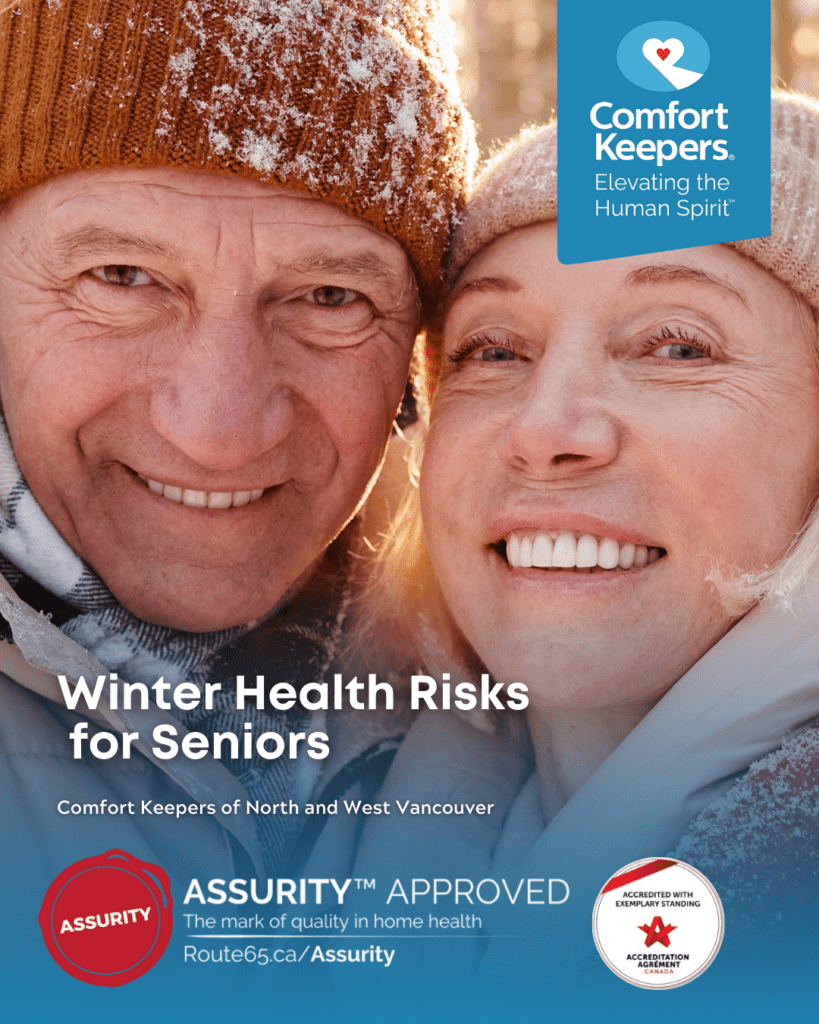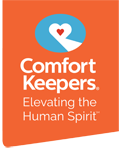Winter Health Risks for Seniors Living in Canada
North Vancouver Senior Health | January 13, 2025

What Every Senior in North Vancouver and West Vancouver Needs to Know About Winter Health Risks
Winter Health Risks for Seniors | When the temperature drops, older adults run a higher risk of health problems and injuries related to the weather. It’s important that they, and those who care for them, take certain precautions at this time of year.
Winter Health Risks – Health Hazards to Avoid:
- Hypothermia means the body has a temperature that has fallen below 95 degrees (35° C) and can’t produce enough energy to stay warm enough. The elderly are at special risk because they may have limited ability to communicate, impaired mobility, less subcutaneous fat, and a diminished ability to sense temperature. Symptoms of hypothermia include; shivering, cold skin that is pale or ashy, lack of coordination, mental confusion, slowed reactions, breathing or heart rate, weakness, and sleepiness. Do not rely on shivering alone as a warning sign, since seniors tend to shiver less or not at all as their body temperature drops. Call 911 if you think someone has hypothermia.
- Frostbite can cause damage to the skin and progress to the bone. It usually affects the nose, ears, cheeks, chin, fingers, and toes. Frostbite can even result in the loss of limbs. Seniors with heart disease and other circulation problems are at risk. Prevention includes covering up all parts of the body when going outside. If the skin turns red, dark, or starts to hurt it’s time to go inside right away. Symptoms of frostbite include; skin that’s white, ashy, or grayish-yellow; feels hard or waxy; or is numb. If frostbite occurs, place frostbitten parts of the body in warm (not hot) water, and call for medical help immediately. A person with frostbite may also have hypothermia, so check for those symptoms, too.
- Heart attacks and high blood pressure are more common in winter because cold snaps increase blood pressure and strain on the heart. The heart has to work harder to maintain body heat, while falling temperatures may cause an unhealthy rise in high blood pressure ─ especially in seniors. In winter, blood pressure increases are seen in both the systolic (top) and diastolic (bottom) numbers. Possible explanations of the cold weather effect include activation of the sympathetic nervous system which helps control how the body responds to stress, and release of the hormone catecholamine, which may increase blood pressure by speeding the heart rate and decreasing the responsiveness of blood vessels.
- Painful joints occur more often in winter, though it’s not clear why this is the case. While many people with arthritis say their joints become more painful and stiff, there is no evidence that weather changes cause joint damage. Mild daily exercise can help, and many seniors rely on indoor swimming sessions during the winter months because swimming is easy on the joints.
- Winter depression is common among seniors, and this can make them perceive pain more acutely. Everything feels worse, including medical conditions. Vitamin D can help. Encourage seniors to consume foods fortified with Vitamin D, such as milk, grains, and seafood like tuna and salmon.
- Lung spasms can occur in seniors with respiratory conditions, including asthma and COPD. Seniors are particularly sensitive to cold air, which can trigger these spasms. Suggest using face or “ski” masks from an outdoor or sporting goods store to use their breath to warm the air before it enters the lungs.
- Influenza can result in pneumonia in seniors. Flu vaccines, while not always effective in preventing illness, can reduce the severity of the symptoms and protect against complications.
Flu vaccines are strongly recommended for persons 65+ years old and those who suffer from chronic health problems such as heart disease, respiratory problems, renal disease, diabetes, anemia, or any disease that weakens the body’s immune system.
Persons allergic to eggs or who have a high fever, however, should avoid or postpone getting a flu shot. Because the influenza vaccine is only effective for one year and viruses vary annually, it is necessary to get a flu shot every year. Do so early, since it takes about two weeks to develop full immunity. However, even a shot in January may protect against a late winter outbreak.
Tips for Avoid Winter Health Risks for Seniors:
- Stay Indoors. Cold temperatures, high winds, snow, and rain can all steal body heat. Wind especially, because it removes the layer of heated air from around the body. If seniors feel they must go outside, don’t let them stay out for very long, and they should go indoors if they start to shiver. Indoors, set the heat at about 65 degrees and keep up on furnace maintenance.
- Stay Dry. Wet clothing chills the body quickly.
- Wear Layers. Wearing two or three thinner layers of loose-fitting clothing is warmer than a single layer of thick clothing. Seniors should always wear layers, as well as a hat, gloves or mittens, a coat and boots, and a scarf to cover the mouth and nose and protect the lungs from cold air.
The Best Senior Home Assistance Care in North and West Vancouver is Comfort Keepers®
Our senior home care agency offers in-home care focusing on aging in place. Our services include; dementia care, end-of-life care, post-surgery care, and palliative care. Comfort Keepers can assist seniors with living transition services, personal care, companionship care, and more!
Quality and Accredited Elderly Care: Happier, Healthier, and at Home with 24/7 Senior Care Opportunities!
Do you need a home care solution for yourself or a loved one? Have you been thinking about retirement homes and their alternatives as a solution? Comfort Keepers® enables seniors to maintain happy, healthy lives in the comfort of their own homes. In-home care services are available in North Vancouver, West Vancouver, and the surrounding areas.
Comfort Keepers® is a Senior Care Agency That Can Make a Difference with Interactive Caregiving™
Our in-home caregivers ensure our senior clients have the best quality of life. The Interactive Caregiving™ program ensures that a senior’s safety, nutrition, mental well-being, and everyday needs are met. This program brings joy and good health to each client’s home.
Comfort Keepers® North Vancouver and West Vancouver Can Help with In-Home Elderly Care Services!
If you are concerned about the health and well-being of a loved one we can help! Comfort Keepers offers 24-hour care and delivers top-quality and compassionate care for seniors. We are dedicated to safety technology solutions that foster independence and enhance well-being.
Locally Owned and Operated Home Health Care Agency
Our care centers around companionship for seniors. Empathetic care originates from the soul and allows us to meet our client’s requirements. The seasoned in-home caregivers employed by Comfort Keepers are carefully chosen based on their empathetic qualities.
Contact the Comfort Keepers® North Vancouver and West Vancouver office at (604) 998-8806 to learn more about our unique in-home care solutions for seniors.
Comfort Keepers is an Accredited Senior Care Agency in North and West Vancouver, BC
Comfort Keepers®, the premium home care service for Seniors on the North Shore, was awarded the “Accredited with Exemplary Standing” seal by Accreditation Canada. Achieving the highest available certification in Canada for Accredited Home care services demonstrates Comfort Keepers® commitment to offering safe, high-quality home care to its senior clients in North Vancouver and West Vancouver.
References:
AgingCare.com. “Little-Known Winter Dangers for Elders”. Web. 2015.
HealthInAging.org. “Winter Safety Tips for Older Adults”. Web. 2011.
National Institutes of Health (NIH). “When the Weather Gets Cold”. News in Health. January 2009. MedicineNet. “Winter Can Pose Hazards for Seniors, Expert Warns”. Web. 2013.
Individualized Home Care Options
Long-Term Home Care, 24 Hour Home Care & Short Term Care Options Customized for You





